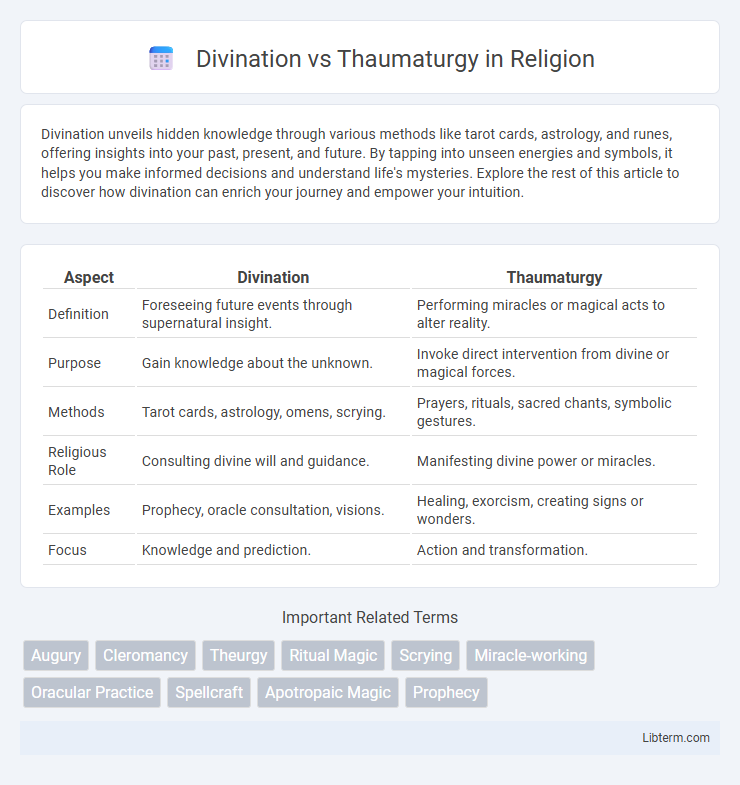Divination unveils hidden knowledge through various methods like tarot cards, astrology, and runes, offering insights into your past, present, and future. By tapping into unseen energies and symbols, it helps you make informed decisions and understand life's mysteries. Explore the rest of this article to discover how divination can enrich your journey and empower your intuition.
Table of Comparison
| Aspect | Divination | Thaumaturgy |
|---|---|---|
| Definition | Foreseeing future events through supernatural insight. | Performing miracles or magical acts to alter reality. |
| Purpose | Gain knowledge about the unknown. | Invoke direct intervention from divine or magical forces. |
| Methods | Tarot cards, astrology, omens, scrying. | Prayers, rituals, sacred chants, symbolic gestures. |
| Religious Role | Consulting divine will and guidance. | Manifesting divine power or miracles. |
| Examples | Prophecy, oracle consultation, visions. | Healing, exorcism, creating signs or wonders. |
| Focus | Knowledge and prediction. | Action and transformation. |
Understanding Divination: Definition and Origins
Divination is the mystical practice of seeking knowledge about the future, hidden truths, or the unknown through supernatural means, often involving rituals, symbols, or mediums. Its origins trace back to ancient civilizations such as Mesopotamia, Egypt, and Greece, where it was integral in guiding decisions from political to personal realms. Unlike thaumaturgy, which involves performing miracles or magic to effect change, divination primarily focuses on insight and revelation, emphasizing prophecy over intervention.
What is Thaumaturgy? An Overview
Thaumaturgy is the magical practice of performing wonders or miracles, often involving the manipulation of physical elements to produce supernatural effects. It is commonly associated with causing tangible changes in the environment, such as creating fire, moving objects, or healing wounds, through arcane or divine power. Unlike Divination, which focuses on gaining knowledge about the past, present, or future, Thaumaturgy emphasizes the direct intervention and alteration of reality through magical means.
Key Differences Between Divination and Thaumaturgy
Divination involves uncovering hidden knowledge or future events through supernatural means, often using tools like tarot cards or scrying. Thaumaturgy, on the other hand, focuses on performing magical feats or miracles that directly manipulate the physical world. The key difference lies in divination's emphasis on insight and prediction, while thaumaturgy centers on tangible changes and miraculous actions.
Historical Contexts of Divination and Thaumaturgy
Divination and thaumaturgy have distinct historical contexts rooted in ancient civilizations' attempts to understand and influence the supernatural. Divination, practiced in Mesopotamia, Egypt, and Greece, involved interpreting omens, dreams, and celestial movements to predict future events and guide decisions. Thaumaturgy, often associated with miraculous acts and seen in religious and magical traditions, focused on invoking supernatural powers to perform wonders or heal, reflecting the cultural need to directly manipulate divine forces.
Tools and Techniques in Divination Practices
Divination employs specialized tools such as tarot cards, runes, pendulums, and scrying mirrors to interpret hidden knowledge and foresee potential outcomes. Techniques include reading symbolic patterns, interpreting visions, and utilizing ritualized procedures to access information beyond ordinary perception. These methods contrast with thaumaturgy, which focuses on producing tangible miracles through magical acts rather than insight or prediction.
Methods and Rituals in Thaumaturgy
Thaumaturgy involves performing specific rituals and symbolic acts to manipulate natural forces, often using items such as talismans, incantations, and gestures to produce observable miracles or magical effects. Methods in thaumaturgy typically require precise timing, adherence to ceremonial protocols, and the invocation of spiritual or supernatural entities to channel power effectively. These rituals emphasize deliberate actions designed to alter reality, contrasting with divination's focus on interpreting signs or obtaining knowledge about future or hidden events.
Philosophical Foundations: Beliefs Behind Each Practice
Divination is grounded in the belief that the future and hidden knowledge can be accessed through supernatural means, reflecting a worldview where fate and destiny are predetermined and can be interpreted. Thaumaturgy relies on the philosophical foundation that miraculous interventions and alterations of reality are possible through inherent magical power or divine will, emphasizing human or supernatural agency in effecting change. Both practices reveal contrasting metaphysical assumptions: divination accepts a fixed cosmic order that can be deciphered, while thaumaturgy asserts the potential for active manipulation of that order.
Cultural Perspectives on Divination vs Thaumaturgy
Cultural perspectives on divination and thaumaturgy vary widely, with divination often regarded as a sacred practice for gaining insight into the future or hidden knowledge, while thaumaturgy is seen as the manipulation of supernatural forces to achieve practical effects. In many indigenous and ancient societies, divination is intertwined with religious rituals and serves as a guide for decision-making, whereas thaumaturgy is sometimes associated with miracle-working or the intervention of deities. The distinction between the two is influenced by cultural values, where divination emphasizes prophecy and understanding, and thaumaturgy focuses on tangible manifestations of supernatural power.
Modern Applications and Interpretations
Divination and thaumaturgy have distinct roles in modern metaphysical practices, with divination focusing on gaining insight and foresight through tools like tarot cards, astrology, and pendulums, while thaumaturgy emphasizes the act of performing miracles or supernatural feats often seen in ritual magic and energy manipulation. In contemporary spirituality, divination is widely adopted for personal guidance, decision-making, and psychological exploration, whereas thaumaturgy is practiced in contexts involving healing, manifestation, and spiritual intervention. Both disciplines blend ancient traditions with modern interpretations, influencing fields such as holistic wellness, ceremonial magic, and New Age belief systems.
Choosing the Right Path: Divination or Thaumaturgy?
Choosing between Divination and Thaumaturgy depends on your focus within magical disciplines: Divination specializes in uncovering hidden knowledge and predicting future events through methods like scrying or tarot reading, whereas Thaumaturgy emphasizes manipulating physical reality and producing miraculous effects, such as enchanting objects or influencing elemental forces. Consider whether your goal is to gain insight and foresight or to exert tangible, immediate influence in the material world. Aligning your path with your intended outcomes ensures a more effective and fulfilling mastery of magical arts.
Divination Infographic

 libterm.com
libterm.com